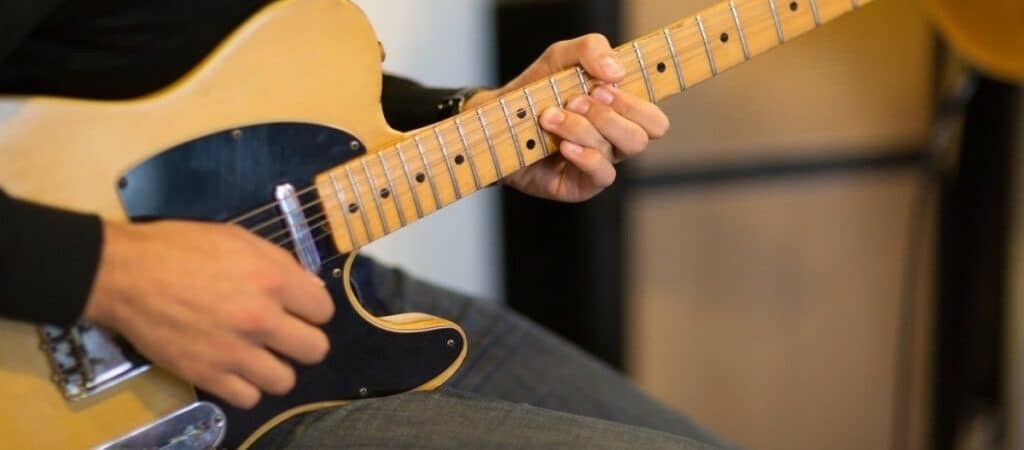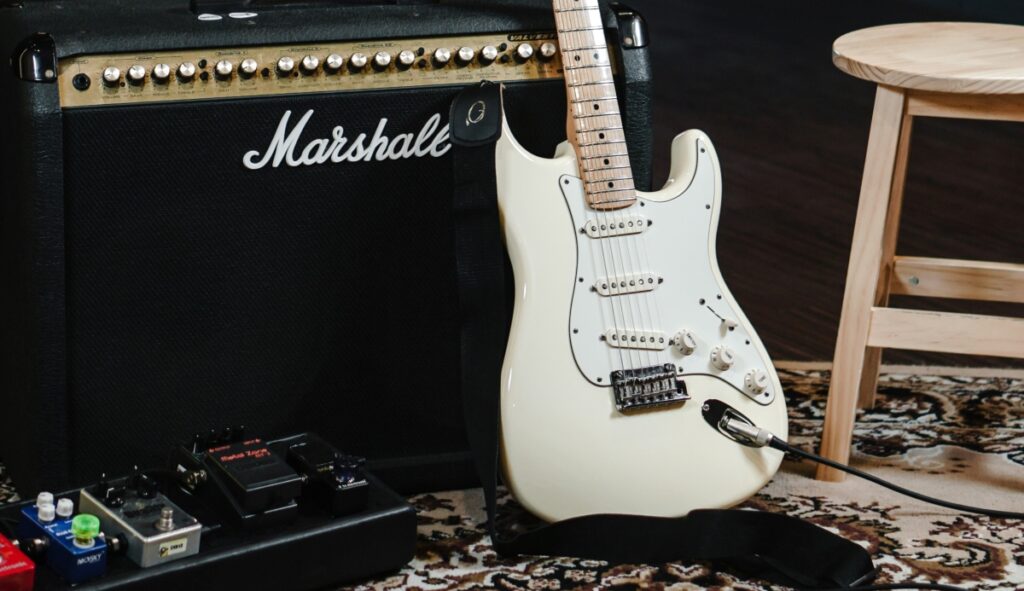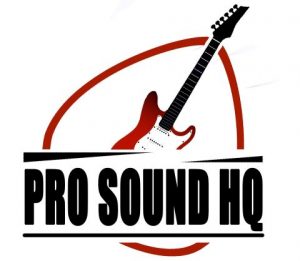There’s a bit of a debate in the guitar world as to whether it’s a good or bad idea to practice an electric guitar without an amplifier and just use it acoustically. In this article I’ll address the pros and cons of playing unplugged, but before we jump in, here’s a brief overview of my opinion…
Playing an electric guitar unplugged is not the best idea as it sounds completely different to when using an amp, and can sometimes lead to technique issues. If you are trying to keep the volume down, consider using an amp with headphones instead or get a mini-amp.

Advantage: It Won’t Annoy Housemates or Neighbours
The main reason why you probably want to play your electric guitar without an amp is to keep the noise level low. If you have housemates or neighbours who share a wall with you, then it can be really tough to plug in your amp without winding them up.
Since most electric guitars are solid, they are much quieter compared to acoustic guitars when played without an amp. In fact, electric guitars when played unplugged read at about 65-80 dB which is about the same volume as a normal conversation so there’s pretty much no chance of you irritating anyone.
Advantage: It’s Quick to Set Up
Sometimes you just want to pick up your electric guitar and have a quick noodle whilst your waiting around or bored for a few minutes.
If you store your cable and amp away after each practice session, the thought of getting them out and setting them up can put you off quickly picking up your guitar (at least this is what happens with me!).
Sometimes I just like to pick my guitar up for 5-10 minutes and don’t have time to get my amp out and set it up so playing unplugged really appeals to me. Practicing unplugged is better than not practicing at all!

Disadvantage: Electric Guitars Do Not Sound Good Unplugged
The main issue with practicing an electric guitar unplugged is that it jus sounds nothing like it will when it’s plugged in. You won’t be able to utilise any gain let alone effects like reverb, and unplugged electric guitars sound so quiet and thin.
Practicing unplugged can be okay if you’re just learning a riff or playing scales, but if you want to play a song then you’ll need to plug your guitar into an amp to get the full effect. Trust me, playing Metallica unplugged just sounds a bit flat.
Disadvantage: It Can Lead to Technique Issues
There’s a bit of a debate as to whether practicing unplugged is good or bad for developing your technique, so I’ll speak by my own experience. Personally, I can learn a song unplugged and think I have it nailed, then go and play it plugged in and I don’t sound good.
When an electric guitar is plugged into an amplifier, it can produce all kinds of unwanted string noise that won’t be noticeable when unplugged. This noise can be controlled, but the only way to learn how is to play plugged in. This will get you used to muting unused strings and stop your playing sounding messy.
Electric guitars are designed to be plugged in, so practicing them that way will help you improve more.

Disadvantage: You Won’t Get Better at Using Your Amp
Being able to properly use your amplifier and understanding how to control it to achieve different sounds is all part of learning the electric guitar. All great guitar players are experts at using their amps and that comes with practice.
If you constantly play unplugged, you won’t be able to practice using your amp and you won’t get the most out of it when you want to plug in. I’d always recommend that players take the time to experiment with their amps and become confident using them to get the full experience of using an electric guitar.
If you want to get better at using your amp, check out these brand-specific amp control guides I’ve written:
- Fender Amp Settings
- Marshall Amp Settings
- Boss Amp Settings
- Orange Amp Settings
- Line 6 Amp Settings
- Vox Amp Settings
Consider Using Headphones (Best of Both Worlds)
If you want the benefits of plugging your guitar into an amp, but can’t risk annoying your housemates and neighbours by making too much noise then using headphones is your next best option.
Many electric guitar amps come with a headphone jack so you can get the best of both worlds.
Alternatively, you can even use a dedicated headphone amp like the the Vox AC30 headphone amp which has very long battery life, 3 amp modes and built-in effects. Check out the Vox AC30 headphone amp out on Amazon. It’s surprisingly very affordable making it a great choice for players who want to practice their electric guitar quietly.
If you don’t like the idea of headphones and just want to keep the volume low, consider using a mini-amp. Mini amplifiers typically have between 1-3W of power which makes them much quieter than full-size amps which are generally at least 10W. These allow you to play out loud without having to wear headphones so you get a truer tone, but prevent you reaching volumes which will make your neighbours hate you.
Most brands make mini versions of their classic amps. Here are some of the most popular with links to Amazon so you can check the current prices:
- Orange Crush Mini (link to Amazon)
- Marshall MS2 (link to Amazon)
- Fender Mini ’57 Twin (link to Amazon)
- Blackstar FLY3 (link to Amazon)
If you really want to improve your guitar playing then I recommend checking out Guitareo. You can sign up for a free 30-day trial here to get access to all the online lessons and start making real progress today
